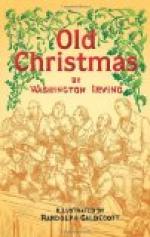* “Ule! Ule!
Three puddings in a
pule;
Crack nuts and cry ule!”
On our way homeward his heart seemed overflowing with generous and happy feelings. As we passed over a rising ground which commanded something of a prospect, the sounds of rustic merriment now and then reached our ears; the Squire paused for a few moments, and looked around with an air of inexpressible benignity. The beauty of the day was of itself sufficient to inspire philanthropy. Notwithstanding the frostiness of the morning, the sun in his cloudless journey had acquired sufficient power to melt away the thin covering of snow from every southern declivity, and to bring out the living green which adorns an English landscape even in midwinter. Large tracts of smiling verdure contrasted with the dazzling whiteness of the shaded slopes and hollows. Every sheltered bank on which the broad rays rested yielded its silver rill of cold and limpid water, glittering through the dripping grass; and sent up slight exhalations to contribute to the thin haze that hung just above the surface of the earth. There was something truly cheering in this triumph of warmth and verdure over the frosty thraldom of winter; it was, as the Squire observed, an emblem of Christmas hospitality, breaking through the chills of ceremony and selfishness, and thawing every heart into a flow. He pointed with pleasure to the indications of good cheer reeking from the chimneys of the comfortable farmhouses and low, thatched cottages. “I love,” said he, “to see this day well kept by rich and poor; it is a great thing to have one day in the year, at least, when you are sure of being welcome wherever you go, and of having, as it were, the world all thrown open to you; and I am almost disposed to join with Poor Robin, in his malediction of every churlish enemy to this honest festival:
“’Those
who at Christmas do repine,
And would fain hence
despatch him,
May they with old Duke
Humphry dine,
Or else may Squire Ketch
catch ’em.’”
The Squire went on to lament the deplorable decay of the games and amusements which were once prevalent at this season among the lower orders, and countenanced by the higher: when the old halls of castles and manor-houses were thrown open at daylight; when the tables were covered with brawn, and beef, and humming ale; when the harp and the carol resounded all day long, and when rich and poor were alike welcome to enter and make merry.* “Our old games and local customs,” said he, “had a great effect in making the peasant fond of his home, and the promotion of them, by the gentry made him fond of his lord. They made the times merrier, and kinder, and better; and I can truly say, with one of our old poets:
“’I like
them well—the curious preciseness
And all-pretended gravity
of those
That seek to banish
hence these harmless sports,
Have thrust away much
ancient honesty.’




